When buying vintage board games I’m always drawn to games that I remember from my own childhood. Even more so if they are exactly the same versions as the ones I had. That’s when my rules about how much I’m prepared to pay go out of the window slightly. That’s certainly what happened with Ratrace.
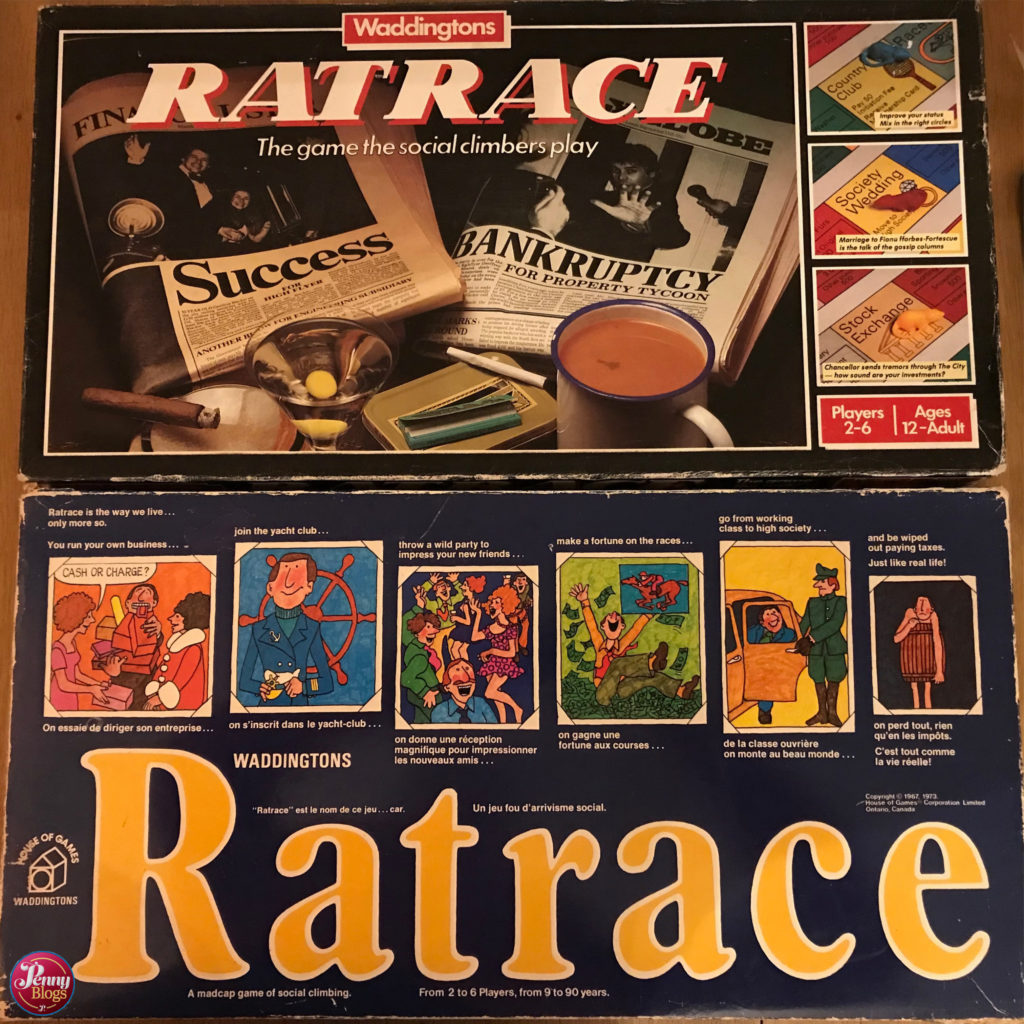
Bottom – the 1973 version of Ratrace
I remember my parents having a copy of Ratrace when I was a child. I can even remember exactly which cupboard it was kept in. For ages I was looking out in charity shops for a copy and when I finally found one I let out a little whoop of joy and quickly headed to the checkout before anyone else could nab it. The fact that I then found a second version just a couple of weeks later intrigued me somewhat. This was obviously more modern than the one I remembered, but it had to come home with me too so I could work out what had changed!
Ratrace – Aim of the game
The aim of Ratrace is to make it to High Society. The board has three concentric tracks on it. The outer one being where everyone start – Working Class. From there players aim to buy Status Symbols, gain a night school diploma or a Country Club membership before they can make their way up to Middle Class. Further Status Symbols, a University Diploma or a Yacht Club Membership are required to get to High Society. There is always the shortcut route up the social ranks though – by marrying the right people!
How to play
The way play works is that each player owns a business – which in turn sells status symbols to the other players. As you work your way around Working Class you buy and sell these Status Symbols and you need to buy a certain number to help you proceed. If you land on the Country Club or Night School you can also buy a membership or diploma that you’ll also need. There is also the square you can land on to take you straight to Middle Class through a society wedding.
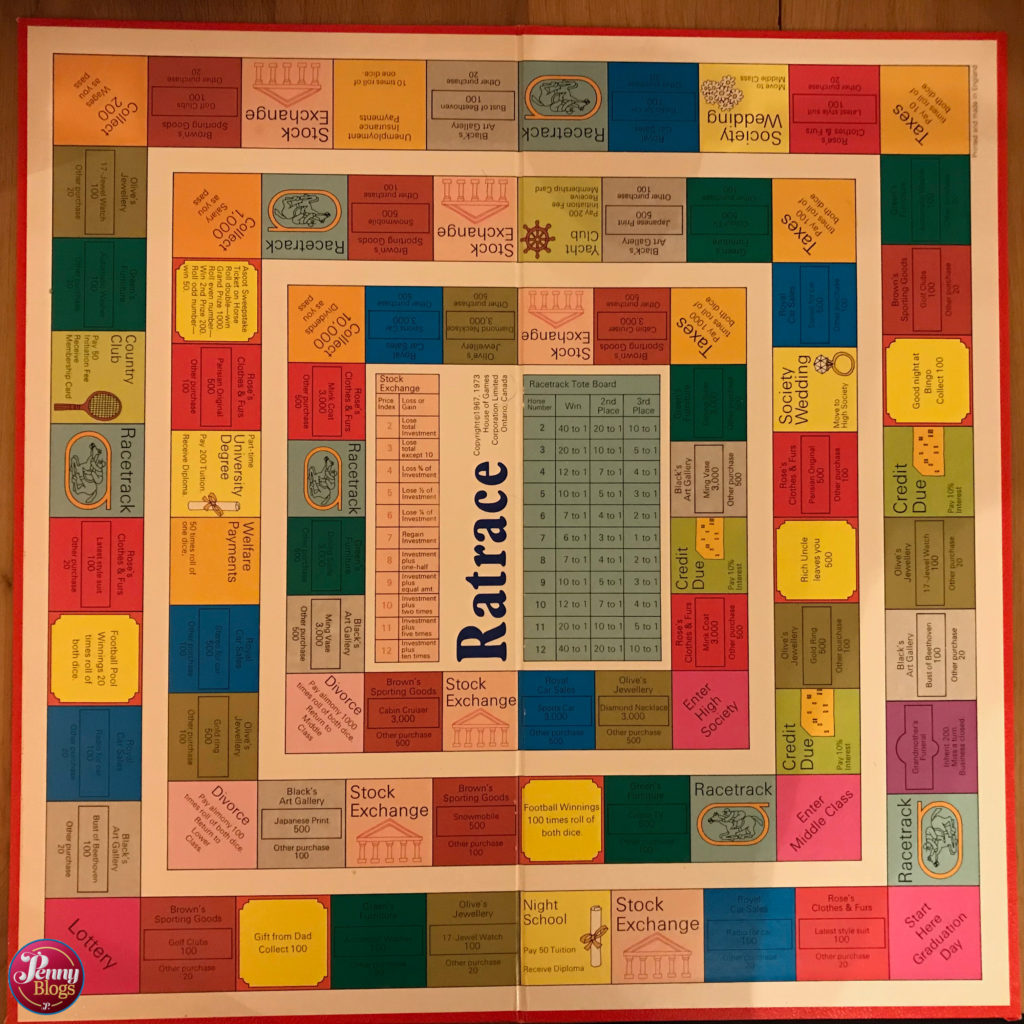
This being a race to High Society they realise that not everyone has enough cash to do everything, and so each player is given a credit card. There’s no limit to what you can put on credit, just as long as you pay off your interest if you land on a square requiring you to do so. You all need to pay off your debts to be able to win the game.
Beware of divorce
The progression from Middle Class to High Society works in a very similar way, only this time both Middle Class and High Society have the added peril of a divorce square. It’s possible you can find yourself socially back at the bottom of the ladder in this game. Maybe I should take notice of the fact that I was booted out of High Society on my first dice roll three times in a row!
1973 Version
The version of Ratrace that I remember from childhood has a very retro feel about it now. The cards for the status symbols are made from very old fashioned matt card, and the choice of colours for the business has a very Seventies feel about it – no one really uses olive and brown as counter colours alongside black, blue, red and green do they?
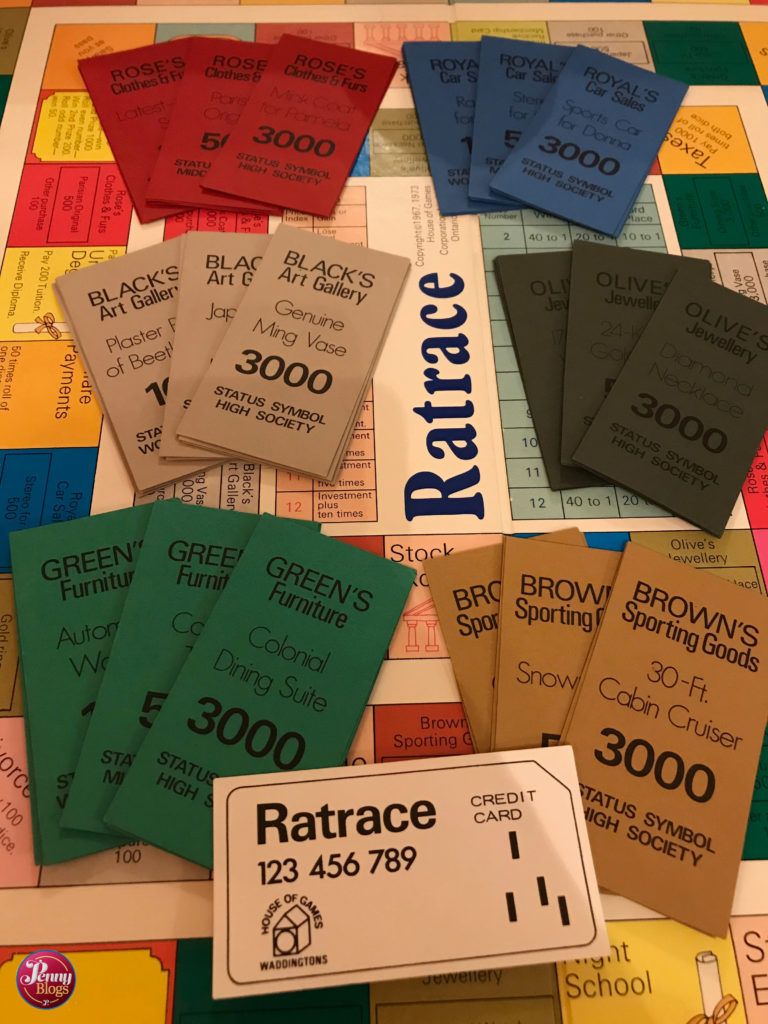
The Status Symbols that players buy and sell are also off their time: golf clubs, a car radio, an automatic washer and a snowmobile. As a child playing this they all sounded like very strange things to want.
An added dimension to Ratrace is the fact that you can also gamble on the Stock Exchange or at the races on the Tote. If you land on the relevant square you have a chance to increase your money (or lose it!) based on the roll of the dice. As a child I always found that part of the game rather thrilling!
1984 Version
It’s fascinating to see how much Ratrace had changed when you compare the version I knew with a 1984 version that I picked up a bit later. The Status Symbols have been updated somewhat to fit in with the 80s more.
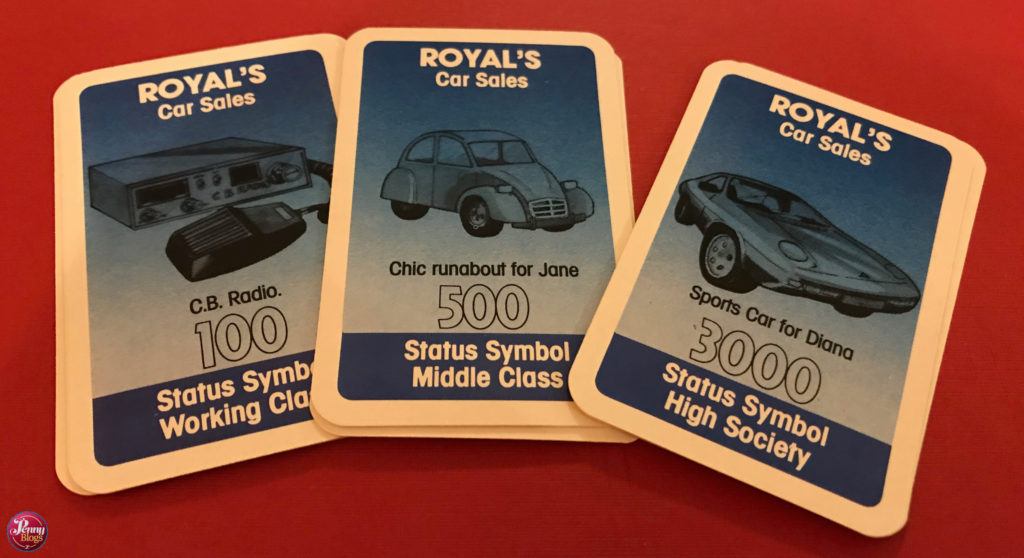
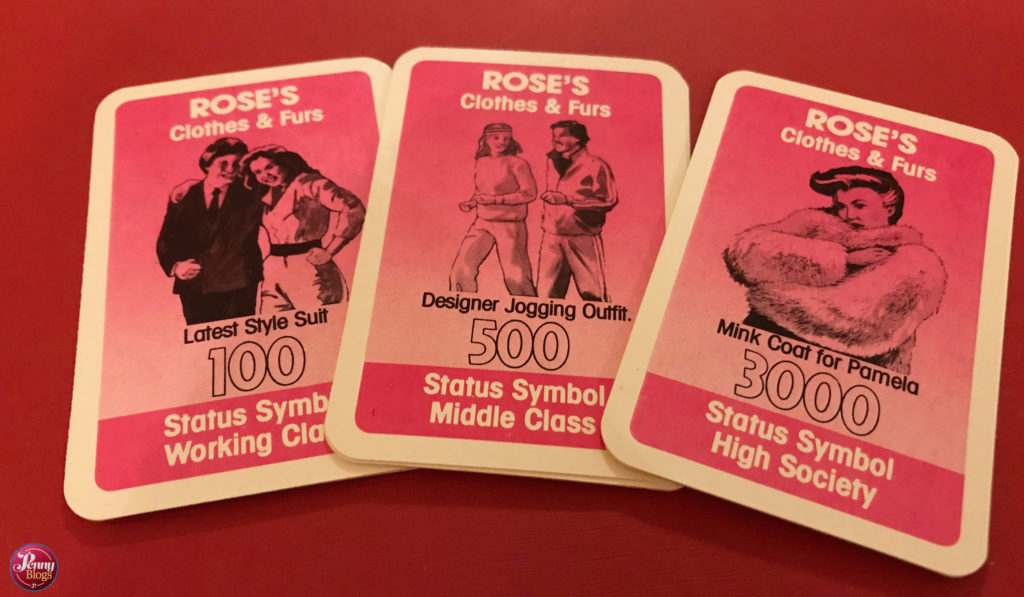
Now people are aiming to own a snooker table, a solarium or even a CB Radio! The physical cards for these status symbols have also changed and are now standard playing card sized with a glossy feel to them.
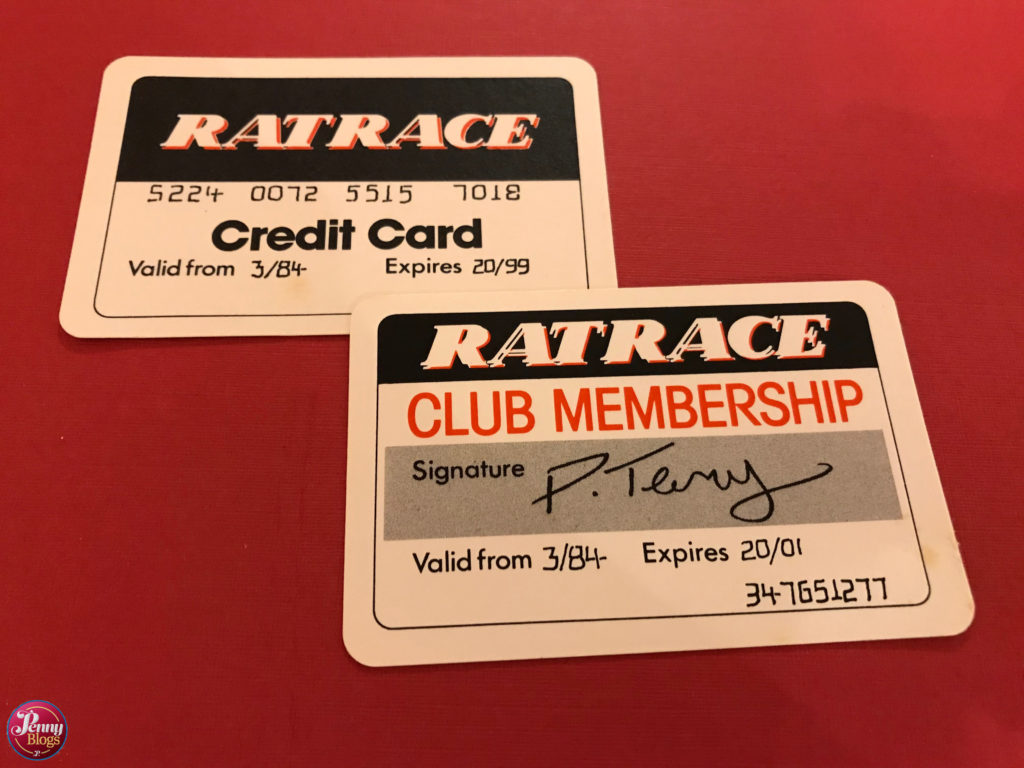
The diplomas, club memberships and credit cards have also been updated and now look much more like the ones that you find as samples inside a new wallet or purse.
Whilst game play remains unchanged, the other obvious difference is in the playing tokens. Whilst in the 70s you just had standard Waddington’s pawns, by 1984 players got a coloured rat instead. I know “rat” is in the name of the game, but to be honest the players have always been people in my mind and the idea of them actually being rats just seems a bit weird to me.
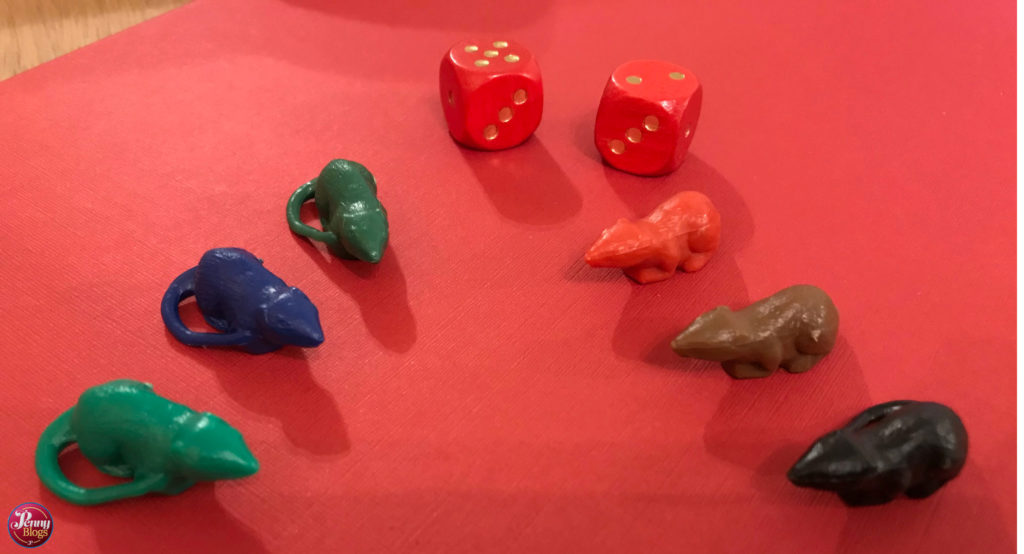
Comedy Instructions
The other thing with Ratrace that really merits a mention is the instructions. Written in a question and answer style, they have a very unique way about them. For instance:
Q Why would I want to spend money on a high-priced Status Symbol?
A Because that’s part of the snobbery to which we all indulge in, to impress our friends and keep up with the Jones. …
They’re a wordy read, and not really ideal if you just want to quickly start playing, but they are comedy in themselves if you read them aloud to everyone. Although that obviously takes a while.
Ratrace doesn’t seem to be in modern day production, but plenty of copies are still available online (either on eBay or on (affiliate link coming up…) Amazon). Sadly you don’t seem to see many copies of it at car boot sales or in charity shops.
Are you a fan of vintage board games?
If you’re interested in vintage board games then why not head over to Facebook and join our new vintage board games group.
For more vintage board games and toys here on Penny Plays take a look here.
Disclaimer – This post contains an affiliate link. If you click through and buy something via this link it will cost you no more, but I will receive a small commission. Small enough that it probably will only buy part of a box of tea bags. Appreciated all the same though!
